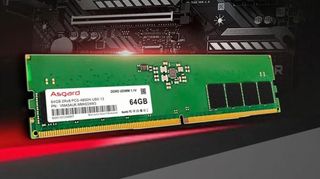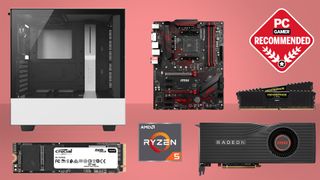DDR5 is really happening this year as another memory maker eyes up Intel Alder Lake
Mass production of these kits in capacities up to 128GB will begin later this year.

Intel is sticking with DDR4 memory for its upcoming Rocket Lake CPUs, just as AMD did with its Zen 3 lineup. But eventually both companies will embrace DDR5 memory, and when they do, there will be no shortage of memory makers ready to go with DDR5 RAM. The latest to enter the fray is Asgard Memory.
I've never heard of Asgard until now, a Chinese memory brand owned by Shenzhen Jiahe Jinwei Electronic Technology Co. Sadly, it does not appear to have any ties to Norse mythology or Thor, which feels like a missed opportunity here. Ah well.
In any event, Asgard plans to produce DDR5 memory in 32GB, 64GB, and even 128GB capacities, according to ITHome (via Tom's Hardware), in speeds up to 4,800MHz. It's not clear if the 128GB capacity will come in the form of a single module or a multi-module kit, but either way, that is a generous amount of RAM by today's standards.
Asgard intends to begin mass producing its DDR5 modules when the12th Gen Core processors based on the Intel Alder Lake design arrive, along with a new 600-series chipset. Alder Lake is a hybrid design similar in concept to Arm's big.LITTLE design, in that it will combine high performance cores with smaller and more power efficient cores in a single package.
Alder Lake is not terribly far off in the distance, either. Even though we're still waiting on Rocket Lake to launch (next month), if things stay on track, Alder Lake will debut towards the end of this year.
AMD is also expected to embrace DDR5 memory, with its Zen 4 chips. Those could potentially arrive by the end of the year as well, and if not, then likely in early in 2022.

Best CPU for gaming: the top chips from Intel and AMD
Best graphics card: your perfect pixel-pusher awaits
Best SSD for gaming: get into the game ahead of the rest
As for the shift to DDR5 RAM, it will bring about faster speeds into the mainstream space, at least eventually. It looks like the first DDR5 kits will run at 4,800MHz, which is not much faster than today's speediest (and most expensive) DDR4 kits. But that is only the starting point for DDR5, as it grabs the baton from DDR4 and sprints to faster specifications.
The biggest gaming news, reviews and hardware deals
Keep up to date with the most important stories and the best deals, as picked by the PC Gamer team.
There are other benefits to DDR5 besides just speed. It uses less voltage, which could potentially yield higher memory overclocks, and it also comes standard with ECC support, or Error Correction Code. The lack of ECC support within the mainstream DDR4 space was the subject of a recent rant by Linus Torvalds, the creator of Linux. Hang in there Linus, ECC is coming to us all.
Asgard will have plenty of company to mingle with when DDR5 becomes relevant. Micron began sampling DDR5 memory a year ago, and both Adata and Team Group have made DDR5 announcements as well. So has SK Hynix, which is already mass producing DDR5 memory.
Paul has been playing PC games and raking his knuckles on computer hardware since the Commodore 64. He does not have any tattoos, but thinks it would be cool to get one that reads LOAD"*",8,1. In his off time, he rides motorcycles and wrestles alligators (only one of those is true).
Most Popular






